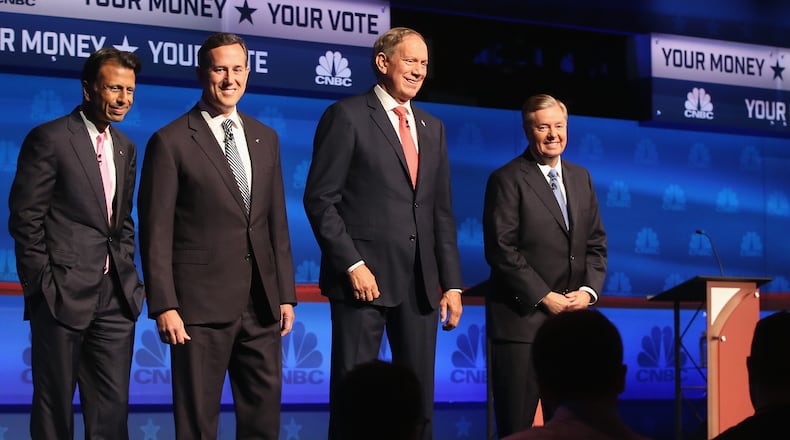Here's some highlights from the AP:
Going after Hillary
The first attack on Democrat Hillary Rodham Clinton in the early Republican presidential candidate debate comes from former New York Gov. George Pataki.
He says the former secretary of state should be disqualified from being president because she maintained an email server at her home and "We have no doubt that was hacked."
South Carolina Sen. Lindsey Graham piled on, saying President Barack Obama's foreign policy needs to be completely replaced and Clinton should be the last person to do that.
Graham says if he's president "the party's over" for the world's dictators.
He says, "Make me commander-in-chief and this crap stops."
Jindal on tax cuts
Louisiana Gov. Bobby Jindal promises to do for the United States what he's done for his state: cut spending and taxes.
Even Republicans in his state have criticized him for cutting spending too much and refusing to raise any taxes or fees to close deficits. The Republican seeking to replace Jindal as governor, Sen. David Vitter, has pointedly said his tax policy will not be like Jindal's.
Jindal stands by his record, saying he's proud he cut taxes in Louisiana and will cut them more in Washington.
Universal family leave
Louisiana Gov. Bobby Jindal says it'd be nice to have universal family leave, but the government can't mandate it.
Jindal is debating in the undercard round of the third Republican presidential debate. He is responding to a question about whether Washington should mandate paid maternity leave.
Jindal says, "The government can't wave a magic wand and make that happen." He adds that government regulations already hurt job growth in many ways.
Former Pennsylvania Senator Rick Santorum isn't worried about a lack of competition in the nation's beer industry. Health care, though, is another story.
Anheuser-Busch is in the process of buying its top competitor, SABMiller, the largest merger in the beer industry. But Santorum says the people of Colorado need not worry, as the state's active craft brewing industry provides plenty of options for beer lovers.
On corporate competition as a whole, Santorum is taking a shot at the health care industry. He says the Affordable Care Act reduces competition in the insurance market, pushing out small insurers. He says it's part of Democrats' plan to lead the nation to a single-payer health care system.
Santorum on Export-Import Bank
Rick Santorum is defending his support for reauthorizing the Export-Import Bank, an unpopular position with some fiscal hardliners, such as the influential anti-tax group Club for Growth.
Santorum is calling the government entity that provides loans to firms seeking business overseas a way to keep U.S. businesses competitive.
Santorum says the Ex-Im Bank's purpose is not to protect corporate giants like General Electric or Boeing.
Sticking with his blue-collar conservative emphasis, Santorum says: "The American workers. That's why we need to have a level playing field to compete with the rest of the world."
Santorum says immigrants deserve blame for some wage decline
Rick Santorum says immigrants are partially to blame for sluggish wage growth.
The former Pennsylvania senator was asked about jobs and wages at the Republican undercard debate Wednesday night.
He argues that the immigration policy backed by his rival, South Carolina Sen. Lindsey Graham, would allow more immigrants in the country and depress wages.
He says "we have to make sure that we're not flooding this country" with low-wage workers.
Graham says it's not realistic to deport 11 million immigrants.
Santorum says workers need to be trained in the skills that are needed, adding "we don't have the right match." He advocates for more job training and better education.
Pataki on corporate taxes
Former New York Gov. George Pataki says he would eliminate "virtually every single" corporate tax loophole in an effort to take on Wall Street. But he's not giving specifics on which, if any, he'd keep.
Instead, Pataki says he'd reduce the tax rate on manufacturing to 12 percent, the lowest in the world. He also says he'd create a fairer tax system for all Americans.
Pataki says it's essential to end the "corrupt connection" between Washington and Wall Street, and says his record passing tax cuts through a Democratic legislature shows he can get it done.
Is Lindsey Graham Republican enough?
South Carolina Sen. Lindsey Graham is launching into a spirited defense of his Republican credentials.
Asked if his acknowledgment of climate change and support for a path to citizenship for immigrants in the U.S. illegally disqualified him from the GOP, he responds, "I'm tired of telling people what they want to hear."
On climate change, he says, "I just want a solution that will be good for the economy, that doesn't destroy it."
On immigration, he says, "We're not going to deport 11 million people."
He says it's time for Republicans to embrace reality because that's how they will win and fix problems.
Taking on insurgent Democratic candidate Sen. Bernie Sanders, Graham says he "went to the Soviet Union for his honeymoon, and I don't think he ever came back."
On the budget deal
Louisiana Gov. Bobby Jindal says the budget deal making its way through Congress is "a very bad deal."
Jindal was the first candidate to rail against the bipartisan deal at the GOP undercard debate — just hours after it passed the Republican-led House.
Credit: Anthony Shoemaker
Credit: Anthony Shoemaker
Asked if he'd rather see the government shut down, Jindal says that's a "false choice." He says the deal includes the promise of budget cuts down the road, but "tomorrow never seems to happen."
New York Gov. George Pataki and South Carolina Sen. Lindsey Graham say they would back the deal.
Graham says he's focused solely on military spending, asking, "Will it restore our ability to defend this nation?"
The bipartisan deal calls for approximately $112 billion in additional spending over two years, with about $80 billion offset by spending cuts elsewhere in the budget.
About the Author


